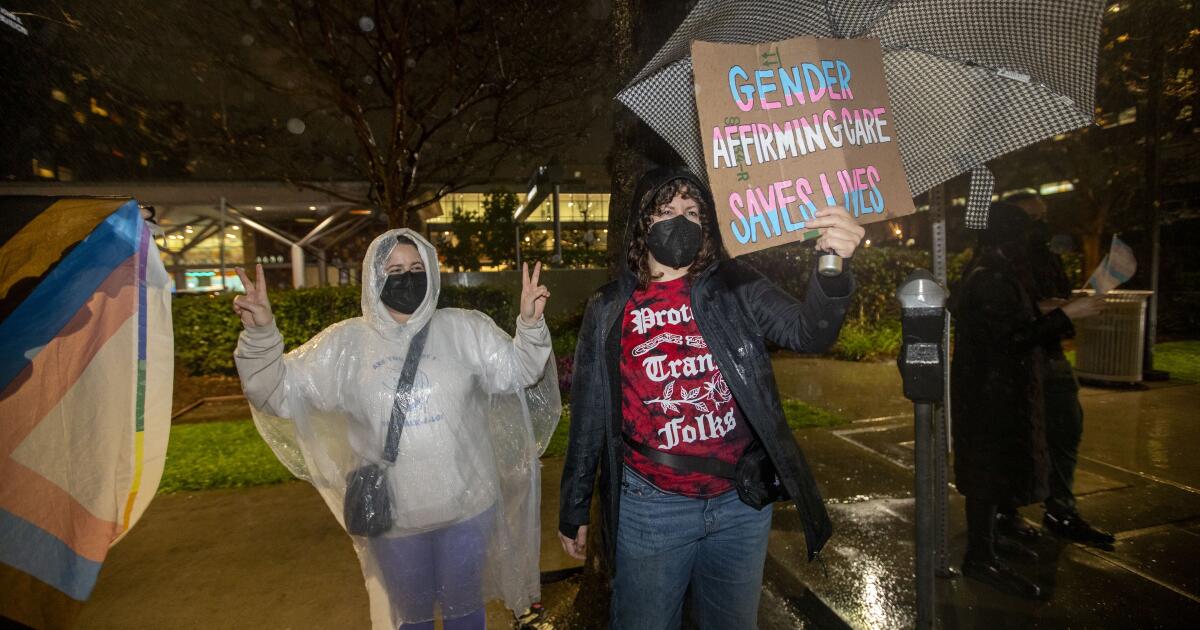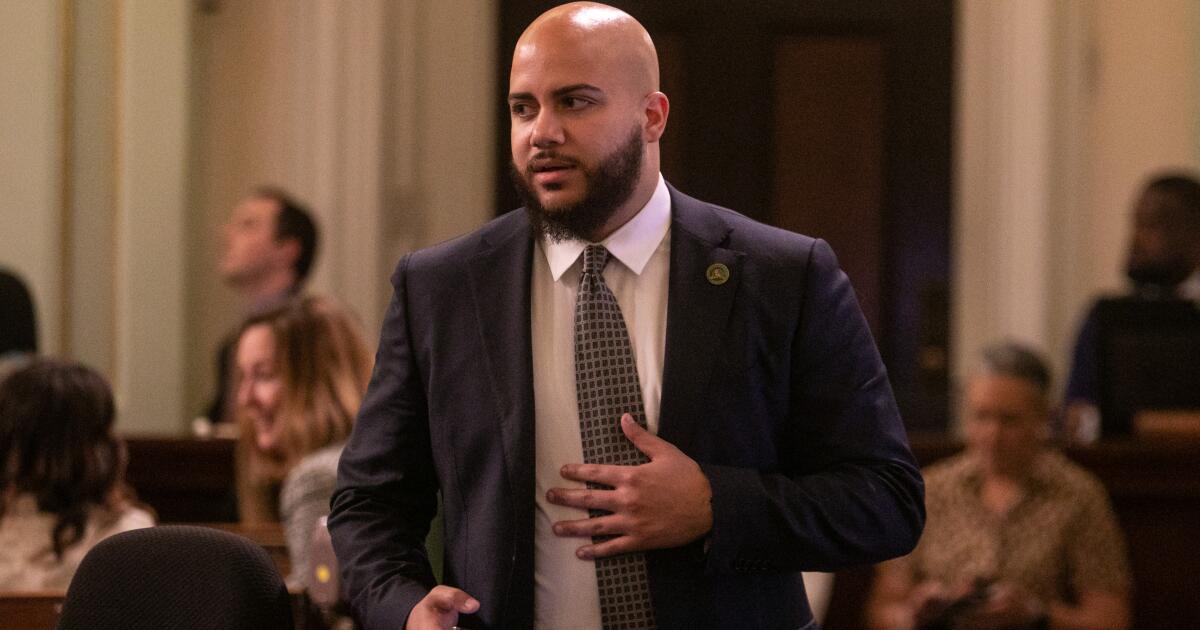Newsom vetoes transgender health measure, after chiding Dems on issue
California Gov. Gavin Newsom this week signed a suite of privacy protection bills for transgender patients amid continuing threats by the Trump administration.
But there was one glaring omission that LGBTQ+ advocates and political strategists say is part of an increasingly complex dance the Democrat faces as he curates a more centrist profile for a potential presidential bid.
Newsom vetoed a bill that would have required insurers to cover, and pharmacists to dispense, 12 months of hormone therapy at one time to transgender patients and others. The proposal was a top priority for trans rights leaders, who said it was crucial to preserve care as clinics close or limit gender-affirming services under White House pressure.
Political experts say Newsom’s veto highlights how charged trans care has become for Democrats nationally and, in particular, for Newsom, who as San Francisco mayor engaged in civil disobedience by allowing gay couples to marry at City Hall. The veto, along with his lukewarm response to anti-trans rhetoric, they argue, is part of an alarming pattern that could damage his credibility with key voters in his base.
“Even if there were no political motivations whatsoever under Newsom’s decision, there are certainly political ramifications of which he is very aware,” said Dan Schnur, a former GOP political strategist who is now a politics lecturer at the University of California-Berkeley. “He is smart enough to know that this is an issue that’s going to anger his base, but in return, may make him more acceptable to large numbers of swing voters.”
Earlier this year on Newsom’s podcast, the governor told the late conservative activist Charlie Kirk that trans athletes competing in women’s sports was “deeply unfair,” triggering a backlash among his party’s base and LGBTQ+ leaders. And he has described trans issues as a “major problem for the Democratic Party,” saying Donald Trump’s trans-focused campaign ads were “devastating” for his party in 2024.
Still, in a conversation with YouTube streamer ConnorEatsPants this month, Newsom defended himself “as a guy who’s literally put my political life on the line for the community for decades, has been a champion and a leader.”
“He doesn’t want to face the criticism as someone who, I’m sure, is trying to line himself up for the presidency, when the current anti-trans rhetoric is so loud,” said Ariela Cuellar, a spokesperson for the California LGBTQ Health and Human Services Network.
Caroline Menjivar, the state senator who introduced the measure, described her bill as “the most tangible and effective” measure this year to help trans people at a time when they are being singled out for what she described as “targeted discrimination.”
In a legislature in which Democrats hold supermajorities in both houses, lawmakers sent the bill to Newsom on a party-line vote. Earlier this year, Washington became the first to enact a state law extending hormone therapy coverage to a 12-month supply.
In a veto message on the California bill, Newsom cited its potential to drive up health care costs, impacts that an independent analysis found would be negligible.
“At a time when individuals are facing double-digit rate increases in their health care premiums across the nation, we must take great care to not enact policies that further drive up the cost of health care, no matter how well-intended,” Newsom wrote.
Under the Trump administration, federal agencies have been directed to limit access to gender-affirming care for children, which Trump has referred to as “chemical and surgical mutilation,” and demanded documents from or threatened investigations of institutions that provide it.
In recent months, Stanford Medicine, Children’s Hospital Los Angeles, and Kaiser Permanente have reduced or eliminated gender-affirming care for patients under 19, a sign of the chilling effect Trump’s executive orders have had on health care, even in one of the nation’s most progressive states.
California already mandates wide coverage of gender-affirming health care, including hormone therapy, but pharmacists can currently dispense only a 90-day supply. Menjivar’s bill would have allowed 12-month supplies, modeled after a 2016 law that allowed women to receive an annual supply of birth control.
Luke Healy, who told legislators at an April hearing that he was “a 24-year-old detransitioner” and no longer believed he was a woman, criticized the attempt to increase coverage of services he thought were “irreversibly harmful” to him.
“I believe that bills like this are forcing doctors to turn healthy bodies into perpetual medical problems in the name of an ideology,” Healy testified.
The California Association of Health Plans opposed the bill over provisions that would limit the use of certain practices such as prior authorization and step therapy, which require insurer approval before care is provided and force patients and doctors to try other therapies first.
“These safeguards are essential for applying evidence-based prescribing standards and responsibly managing costs — ensuring patients receive appropriate care while keeping premiums in check,” said spokesperson Mary Ellen Grant.
An analysis by the California Health Benefits Review Program, which independently reviews bills relating to health insurance, concluded that annual premium increases resulting from the bill’s implementation would be negligible and that “no long-term impacts on utilization or cost” were expected.
Shannon Minter, legal director for the National Center for LGBTQ Rights, said Newsom’s economic argument was “not plausible.” Although he said he considers Newsom a strong ally of the transgender community, Minter noted he was “deeply disappointed” to see the governor’s veto.
“I understand he’s trying to respond to this political moment, and I wish he would respond to it by modeling language and policies that can genuinely bring people along.”
Newsom’s press office declined to comment further.
Following the podcast interview with Kirk, Cuellar said, advocacy groups backing SB 418 grew concerned about a potential veto and made a point to highlight voices of other patients who would benefit, including menopausal women and cancer patients. It was a starkly different strategy than what they might have done before Trump took office.
“Had we run this bill in 2022-2023, the messaging would have been totally different,” said another proponent who requested anonymity because they were not authorized to speak publicly on the issue.
“We could have been very loud and proud. In 2023, we might have gotten a signing ceremony.”
Advocates for trans rights were so wary of the current political climate that some also felt the need to steer clear of promoting a separate bill that would have expanded coverage of hormone therapy and other treatments for menopause and perimenopause. That bill, authored by Assembly member Rebecca Bauer-Kahan, who has spoken movingly about her struggles with health care for perimenopause, was also vetoed.
In the meantime, said Jovan Wolf, a trans man and military veteran, patients like him will be left to suffer. Wolf, who had taken testosterone for more than 15 years, tried to restart hormone therapy in March, following a two-year hiatus in which he contemplated having children.
Doctors at the Department of Veterans Affairs told him it was too late. Days earlier, the Trump administration had announced it would phase out hormone therapy and other treatments for gender dysphoria.
“Having estrogen pumping through my body, it’s just not a good feeling for me, physically, mentally. And when I’m on testosterone, I feel balanced,” said Wolf, who eventually received care elsewhere. “It should be my decision and my decision only.”
KFF Health News is a national newsroom that produces in-depth journalism about health issues and is one of the core operating programs at KFF — the independent source for health policy research, polling, and journalism.

